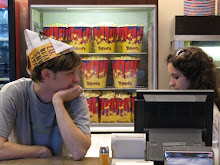 The Louisiana film and TV industry will see its latest high-profile project debut tonight on FOX. "K-Ville" is a cops drama starring Anthony Anderson ("Transformers," "Hustle & Flow," "See Spot Run") and Cole Hauser ("The Break-Up," "Paparazzi," "Good Will Hunting"). Set in post-Katrina New Orleans, this series is bound to inspire good water-cooler chatter.
The Louisiana film and TV industry will see its latest high-profile project debut tonight on FOX. "K-Ville" is a cops drama starring Anthony Anderson ("Transformers," "Hustle & Flow," "See Spot Run") and Cole Hauser ("The Break-Up," "Paparazzi," "Good Will Hunting"). Set in post-Katrina New Orleans, this series is bound to inspire good water-cooler chatter. Does it have staying power? We'll learn tonight at 8 p.m. I've always liked these two actors, and I hope their performances will rise above the expected pyrotechnics of the pilot episode.
Reviews are mixed.
Wall Street Journal loved it: "So far, it is also notable because in the pair of cops at the center of the show, the usual sidekick role is reversed: The black cop Marlin Boulet (Anthony Anderson) is just as prominent, if not more so, than his white partner, Trevor Cobb (Cole Hauser). Like the city itself, however, almost everybody here is damaged or desperate in some way. After just a few minutes, you want to know more about every bit of it. …
"The cops of 'K-ville' are working in a semi-'Blade Runner' environment, where the criminals steal street signs so the police can't find their way around. For added authenticity, the opening episode also features a woman who has bought a car with her FEMA relief money. 'I gotta ride in style,' she explains. To which Boulet replies: 'On the taxpayers' backs?'"
The Los Angeles Times loathed it: "Lost in all the plot and character contrivance is any sense of the city -- a few gumbo and bourbon references are most certainly not enough. This seemingly determined lack of evocation not only makes the choice of setting seem manipulative -- it isn't cool to use a devastated city as a 'hook' -- but it also undermines 'K-Ville's' main character. To understand why Marlin is fighting so hard to save his city, we must understand his city."
The paper of record in this instance, though, is The Times-Picayune. TV columnist Dave Walker writes that the beginning is imperfect, but he's willing to give it a chance to develop. Here's one of my favorite excerpts about the difficulty of representing New Orleans: "Despite its latent potential and good look, locals will immediately despise elements of 'K-Ville' because they always do. Nobody gets us entirely right. Actually, some of the local reaction to 'K-Ville' will be rooted in past attempts to capture New Orleans in movies ('The Big Easy') and on TV ('Orleans,' 'The Big Easy'). It just can't be done.
"One of the main cops drinks on the job, tortures a crime suspect and makes gratuitous gumbo references. There's too much gunplay, even for a show set in New Orleans. The premiere's main story line feeds on folklore that should be debunked instead of mythologized."
Some of you have seen it already, but I'm going to wait until after tonight's premiere to share my thoughts. I hope you will post yours, too.










5 comments:
It seems to me that movies and tv shows are generally modeled after a real life situation which has been resolved. (Braveheart, the Path to 9/11, Stand by Me.) So far, NO is lacking the resolution. Murder and violent crime are still among the highest in the Nation, and the LA Governor still hasn't dished out all the money she received.
It's kinda like filming and releasing United 93 sometime after the plane takes off, but before the plane actually crashes.
That's a really interesting point, and I wonder how that plays into its reception. If we are dramatizing crises before they are resolved, are audience more or less likely to pay attention?
Didn't see it but I have to wonder if the rest of America is tired of hearing about New Orleans?
Disaster fatigue? I think that may play into news coverage, but I'm not sure it applies too much to a cops drama.
Viewers will turn in if it entertains. It not, they'll change channels. I think the real problem for "K-Ville" is the competition it faces from better cops series on cable.
Hey! I just contradicted myself! Darn blogs.
Post a Comment